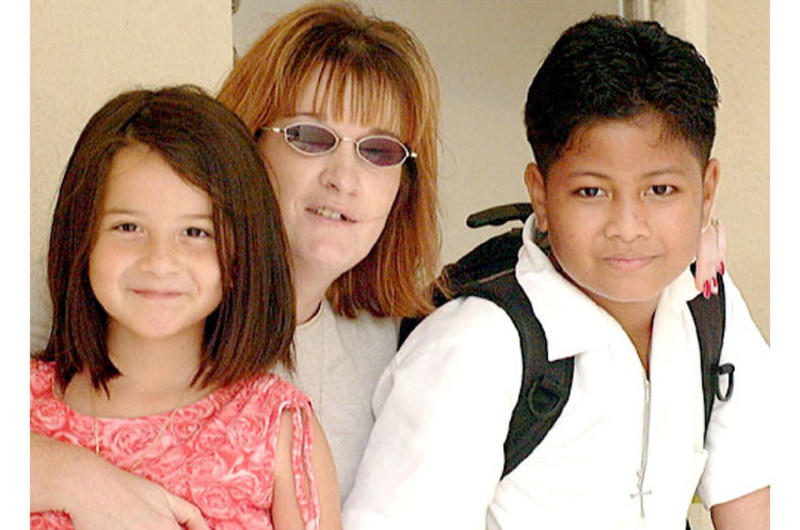

This website was created and maintained from May 2020 to May 2021 to commemorate the 75th anniversary of Stars and Stripes operations in the Pacific.
It will no longer be updated, but we encourage you to explore the site and view content we felt best illustrated Stars and Stripes' continued support of the Pacific theater since 1945.
Military helps families offset high cost of adoption

Sitting with his mother, Samoan-born Alejandro says he’s happy with his new adoptive family. Sister Zoe, 6, says it’s nice having a brother, but hard learning to share. Not shown is father Staff Sgt. Juan Piedra who was deployed to Thailand for a military exercise.
By Carlos Bongioanni | Stars and Stripes June 10, 2003
CAMP McTUREOUS, Okinawa — Jennifer Piedra was ready for another child.
However, Piedra, 32, already the mother of a girl, is unable to have any more children because of medical conditions. A few years ago, she swore “there was no way in hell” she would spend a bundle of money to buy a child.
Then, she said, her maternal instincts kicked in, over-riding the financial factor.
She finalized adopting a Samoan child April 1. Alejandro Kiso, 9, she said, is worth every penny of the $23,000 the family spent.
It was a monumental task acquiring the money, said the mother, noting she and her husband, Staff Sgt. Juan Piedra, exhausted their savings, took out loans, applied for and received grants, borrowed from relatives and maxed out charge cards to make the adoption happen.
The moment she saw the boy’s picture on the Internet, Piedra said, she couldn’t get his “adorable” face out of her mind. For six weeks last fall, she saw him posted on the Web page of Focus on Children, an international adoption and humanitarian agency. Nobody had taken him, she said, because most people typically adopt young children, toddlers and infants.
The boy, one of nine children of an impoverished Samoan family living on a platform with a raised wooden floor and thatched roof on a plantation, decided he wanted a better life. He asked his parents — who had been kicked out of a local village because of cult religious practices — to relinquish him to a government foster home, where he became a ward of the state and put up for adoption.
He never owned a pair of shoes, never had a toy, never slept in a bed and wore only a “lava lava” — a sarong cloth skirt wrapped around his waist, said the mother.
On March 24, the Piedras met Kiso, whom they renamed Alejandro, at a hotel lobby in Apia Samoa’s capital.
“It was the same feeling I had the minute our daughter was born,” said the mother. “He had the biggest smile on his face for weeks.”
Along the way, the Piedras learned — to their great delight — the military gives financial assistance to members who adopt.
Military families can receive up to $2,000 per child younger than 18 — but a maximum of $5,000 per calendar year, said Gunnery Sgt. Dale Cox, Marine Corps legal assistance chief on Okinawa.
Although they could have used the money up front to pay for the expenses, Piedra said they are thrilled they’ll recoup $2,000 later. She said they also learned they can claim a $10,000 adoption-expense deduction on their tax returns.
Recipients must use the reimbursement only to help offset the cost of legal, medical and adoption agency fees for international or American adoption, said Cox. They cannot use it to offset foreign or domestic travel costs.
Parents who adopt their stepchildren do not qualify for the money, said Cox.
After eight weeks on Okinawa, the boy is adjusting well, said the mother, though he’s still getting used to the toilet and learning to wear underwear.
He’s enrolled in school, learning English and feeling like a “crown prince” in his new military housing with his own room and sleeping in his own bed, she said.
Everything is new to him. And the gratefulness he displays saying “thank you” with the utmost sincerity for everything he receives — even a cup of water — has transformed the family and caused them to realize how privileged they have been all their lives.
“Mommy, when I be 18, I want be Marine like daddy,” the mother quoted the child as saying after he watched in awe as Marines marched down the street. His dream is to return to Samoa as a Marine and show everybody that he made something of himself, she said.
After her adoption experience, Piedra created a Web page at www.adoptsamoa.com with information and links to help others interested in adopting children from Samoa.


